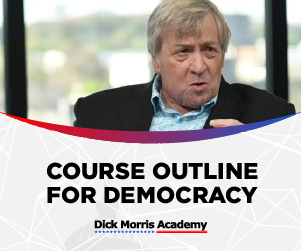EUGENE J. MORRIS 1910-2010
Gene Morris was a force of nature. Strong, dynamic, energetic, and industrious, but also tender, loving, loyal, mentoring, and creative. He died on Saturday, July 24, 2010, but three months shy of his 100th birthday.
My father – I am an only child – was my inspiration and role model throughout my life. He first taught me about politics on our long walks to his office through Manhattan’s Central Park.
He came from a political family. His uncle, Albert Cohn, served as a judge on New York State’s top court and was a close associate of Ed Flynn, FDR’s political advisor. Al’s son and my father’s first cousin was Roy Cohn who went on to fame as chief counsel to the McCarthy Committee investigating communism in the 1950s. My father and Roy were close.
My mother, Terry Morris, was a well known magazine writer and a founder and past president of the American Society of Authors and Journalists. They were married until her death in 1993. At our dinner tables, the discussion was always lively and focused on the political issues of the day. As a result, I grew up into a life of politics.
My father’s mentoring continued until his death. During my time in the Clinton White House, he would avidly follow my dealings with the president and his staff and constantly offer his usual stream of good advice.
But it was after my service there, when my life was engulfed by scandal, that he was my most cherished support and guide. “You’ll be back on top in no time,” he said, constantly encouraging me and offering affirmation at the worst time of my life. Indeed, when I did my first media interviews after the scandal, he accompanied me to each one, offering his support and love.
A liberal Democrat, he never agreed with my move to the Republican Party, but he also did not let his political outlook interfere with his support for me. He watched all my TV shows and rooted for me openly.
The essence of my father’s life was adaptability. No matter what life threw at him, he adapted. Nowhere was this more evident than when, on the death of my mother after 59 years of a loving marriage, he picked himself up and married his old high school and college prom date, Blanche Funke with whom he lived for fourteen more loving years!
Gene had a very long and distinguished career. A lifelong New Yorker, he labored under the handicap of a disrupted family life in his youth. His father, William DeVeze, deserted the family when my Dad was only three, leaving his mother and my father’s sister alone.
Gene’s mother, Regina Cohn, moved in with her mother, Nettie Cohn, and worked for her keep as the family’s maid and housekeeper. Gene lived there from the age of 3-8 in a converted storage room. It was there that he first began to bond with his uncle Al Cohn, who was about fifteen years his senior and lived in the same household.
When Gene turned eight, his mother married a ne’er do well named Max Morris who was perpetually unemployed and verbally abusive. My father hated Max cordially. Regina set up a millinery shop in Harlem — where they lived – to support the family and Gene took jobs from the age of eleven on.
He entered City College, the only free school available, in 1928, graduating in 1931. He taught art for a while but decided to become an attorney, graduating St. John’s Law School (also in New York City) in 1934.
He rose rapidly in the legal community, but his blossoming career came to a pause in 1943 when he enlisted, at age 33, in the Army as a private during World War II.
On his discharge, as master-sergeant, in 1945, he formed the law firm of Demov and Morris. There, he took a two man law firm and built it into the top real estate firm in New York City. He pioneered the concept of urban renewal, dotting the New York landscape with middle income housing projects and handling the legal work for Lincoln Center for the Performing Arts. His clients included a who’s who of real estate – Donald Trump and his father Fred, Sam Lefrak, Bob Tishman, Bernard Spitzer (father of former New York Governor Eliot) and a host of others.
He authored a weekly column in the New York Law Journal on real estate law which covered the latest statutes and court decisions. He was articles editor of the American Bar Association’s magazine Property and Probate. He chaired the New York Bar Association Real Property Law Committee for years.
Again, he showed his amazing adaptability when his law firm — to which he had given his life — dissolved in 1988, a product of overly rapid growth. He went to work, at age 78, as general counsel for a title insurance company, began to write legal texts – ultimately authoring 27 volumes, and started to teach law at NYU. He continued to teach until he retired at the tender age of 97.
I will miss him so.
Ours’ was a very current and alive relationship. Even when colon surgery forced him to curtail his activities, he read history and biography voraciously and we would discuss the volumes intently in our thrice-weekly visits. His mind never failed until the moment of his death.






